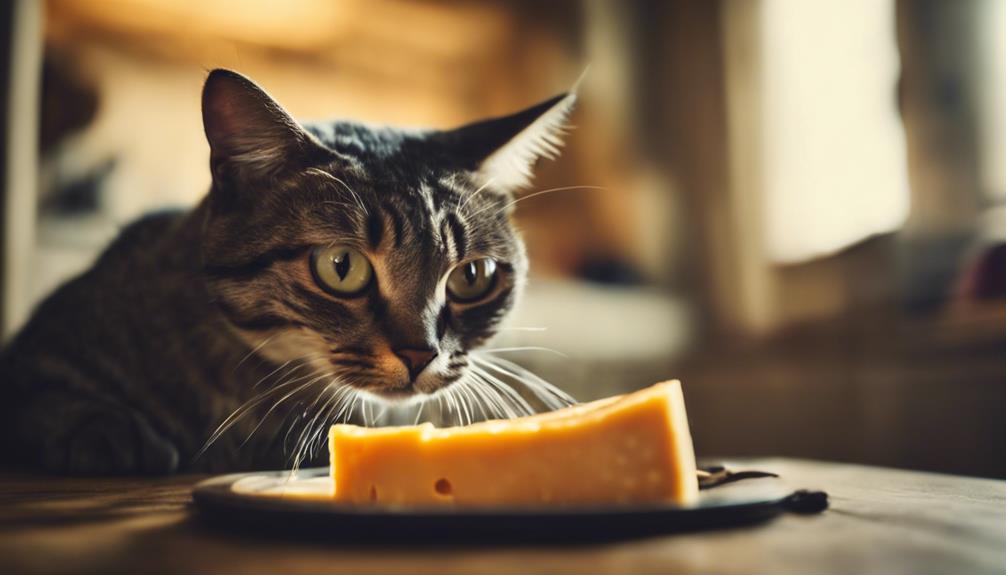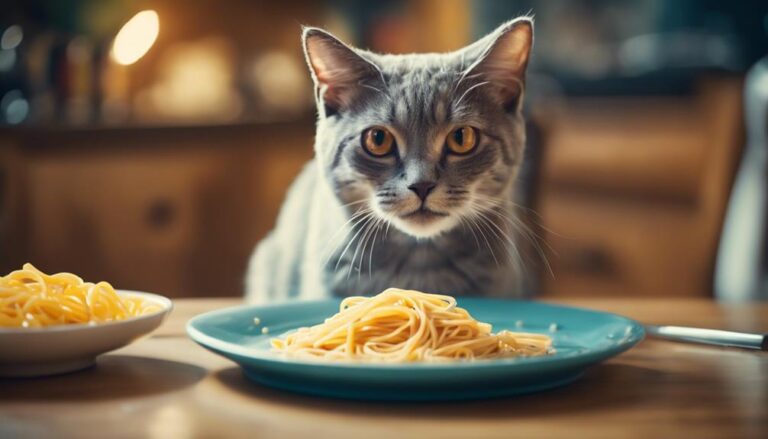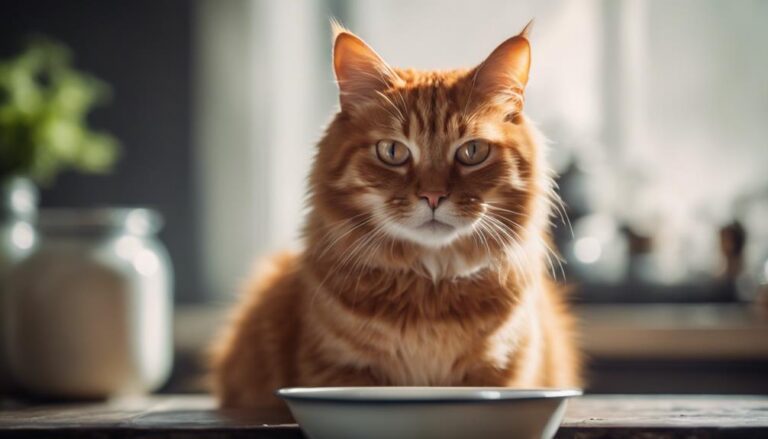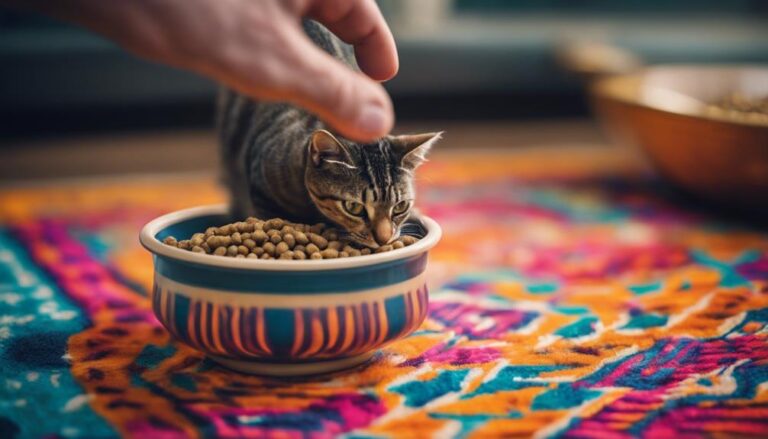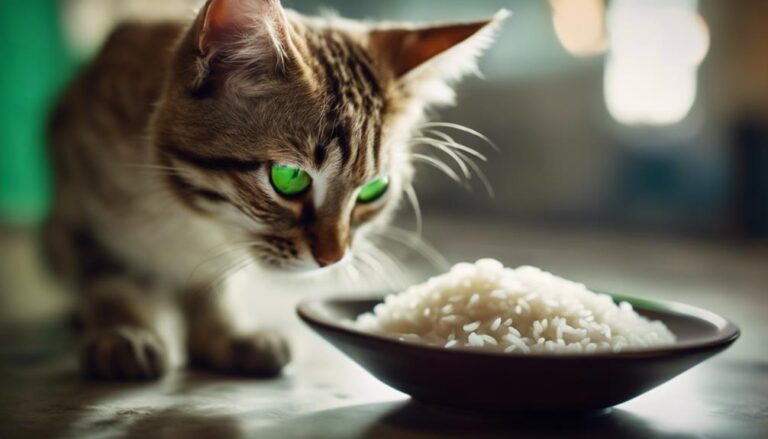If you've ever wondered whether your feline friend can indulge in a cheesy treat, the answer might surprise you. While cats may show interest in cheese, there are important factors to consider before sharing this snack with them. It's crucial to understand how cats' bodies process dairy products and what potential risks cheese consumption can pose to their health. Before you make a decision about offering cheese to your cat, there are a few key points you should be aware of.
Cats' Digestive System and Cheese
Since cats are typically lactose intolerant, their digestive system struggles to process dairy products like cheese effectively. While some cats may show a fondness for cheese, it can lead to digestive issues like diarrhea and vomiting due to their inability to properly digest lactose.
As cats mature, they often lose the enzymes needed to break down dairy, increasing the likelihood of gastrointestinal problems when consuming cheese. The high fat content in cheese can also contribute to obesity in cats, underscoring the importance of monitoring their cheese intake.
Feeding cheese to cats can result in digestive problems such as diarrhea or vomiting, emphasizing the potential negative impact of including dairy products in their diet. To ensure your feline friend's digestive health, it's advisable to steer clear of offering them cheese or any other dairy treats that could upset their stomach.
Lactose Intolerance in Cats
If your cat experiences diarrhea, vomiting, or abdominal discomfort after consuming dairy products like cheese, they might be lactose intolerant.
This intolerance stems from the lack of lactase enzyme in most adult cats, hindering their ability to digest lactose.
Understanding the symptoms of lactose intolerance in cats is crucial for their health and well-being.
Cat's Digestive System
When it comes to cats and their digestive system, understanding lactose intolerance is crucial for their well-being. Cats are lactose intolerant, meaning they lack the enzyme needed to digest dairy products. Therefore, it's best to avoid feeding your cat cheese or any dairy as they can't digest it properly.
Even a small amount of cheese can cause digestive issues like diarrhea or vomiting due to the high fat content. While cheese might seem like a good treat, it's important to remember that dairy isn't healthy for cats and can lead to gastrointestinal problems, especially in kittens with their reduced ability to digest lactose.
Avoid giving your cat cheese to prevent discomfort and digestive disturbances.
Symptoms of Intolerance
Cats with lactose intolerance may exhibit symptoms such as diarrhea, gas, and bloating after consuming cheese. Lactose intolerant cats lack the enzyme lactase necessary to digest lactose in cheese, leading to digestive issues. Symptoms of lactose intolerance in cats can vary, including vomiting and abdominal discomfort.
It's crucial to avoid feeding cheese to lactose intolerant cats to prevent gastrointestinal problems. Monitoring their reactions post-consumption can help identify any intolerance symptoms. Cheese can be bad for lactose intolerant cats due to the potential adverse effects on their digestive system.
If your cat shows signs of intolerance, it's best to steer clear of cheese to keep them healthy and prevent discomfort.
Risks of Overfeeding Cheese
Overfeeding cheese to your feline companion can pose significant health risks due to its high fat content. Cats are small animals that may struggle to digest large amounts of cheese, leading to potential digestive issues such as diarrhea and vomiting.
Moreover, the high-fat content in cheese can contribute to weight gain in cats if consumed excessively. Skin diseases are also a concern with regular cheese intake, as it may not provide the essential nutrients necessary for a cat's overall health.
To prevent these risks, it's crucial to limit cheese consumption to a small dice-sized square once or twice a week. While cats can eat cheese in moderation, it shouldn't replace their balanced diet tailored to their specific nutritional needs.
Health Benefits of Cheese
Cheese offers calcium for strong bones.
It serves as a protein source for your furry friend.
It can be a tasty addition to their diet when given in moderation.
Calcium for Bone Health
Among the various health benefits that cheese offers, one standout advantage is its role in providing essential calcium for maintaining strong bone health in felines. Cats require adequate calcium for proper skeletal development, muscle function, and nerve transmission. Cheese, being a dairy product, should be fed in moderation, especially if your cat has a dairy allergy or lactose intolerance.
Including cheese in your cat's diet can help prevent bone-related diseases and support overall bone structure and health. For kittens, a balanced diet that includes cheese in appropriate amounts can contribute to their skeletal growth and development.
Protein Source for Cats
To maintain your cat's health, consider the protein benefits that cheese can offer as part of their diet. Cheese serves as a protein source for cats, providing essential amino acids crucial for their well-being. The protein in cheese plays a vital role in supporting muscle growth and aiding in muscle repair processes in cats.
Additionally, cheese contains calcium, which contributes to your cat's bone health and overall growth. Cats may find the taste of cheese appealing, making it a potentially enjoyable protein-rich treat for them. When given in moderation, cheese can offer several health benefits to cats as a protein source. Remember to include cheese in your cat's diet carefully to harness its nutritional advantages.
Moderation Is Key
For optimal health benefits, it's important to feed your cat cheese in moderation. While cheese is high in protein and calcium, it should only be given as an occasional treat to prevent digestive issues, especially if your cat is lactose intolerant. Remember that commercial cat treats can serve as healthier alternatives to cheese, ensuring a balanced diet for your feline friend.
Moderation is key when it comes to incorporating cheese into your cat's diet. Keep in mind that a varied diet is essential for your cat's overall health and well-being. So, offer cheese sparingly and consider other nutritious options to maintain a healthy lifestyle for your pet.
Cheese Alternatives for Cats
When looking for cheese alternatives for your feline friend, consider lactose-free options like cheddar or Swiss to cater to cats with lactose intolerance. Plant-based cheese alternatives, such as those made from soy or almond, provide a dairy-free option for your cat.
Additionally, nutritional yeast and cat-specific cheese treats are cat-friendly alternatives worth exploring. If your cat enjoys the taste of cheese, cheese-flavored cat treats without actual cheese can be a delightful option.
For a more natural approach, offering small pieces of cooked, lean meats like chicken or turkey can be a healthy and safe alternative to cheese. These alternatives can provide variety in your cat's diet while ensuring they receive the necessary nutrients without the potential issues that dairy-based products might cause.
Experiment with different options to discover what your cat enjoys most while keeping their health in mind.
Consulting a Vet for Guidance
Considering consulting a vet for guidance on whether cheese is safe for your cat is a wise decision to ensure their dietary needs are met effectively. Vets can provide tailored advice specific to your cat's health requirements, helping you make informed decisions regarding their diet. Here are some key reasons why consulting a vet is beneficial:
- Vets can determine if your cat is lactose intolerant or allergic to dairy, preventing any potential health issues that may arise from cheese consumption.
- A vet can recommend suitable portion sizes of cheese for your cat, ensuring they enjoy it in moderation without any adverse effects on their well-being.
- Seeking a vet's advice can help prevent digestive issues or allergies in your cat, as they can offer insights into safe cheese alternatives that cater to your cat's dietary restrictions.
Frequently Asked Questions
What Happens if My Cat Eats Cheese?
If your cat eats cheese, they may experience upset stomach, vomiting, diarrhea, lethargy, and skin issues. Cats with lactose intolerance can have more severe reactions. Monitoring for adverse effects is crucial for your cat's health.
How Much Cheese Is Safe for Cats?
When considering the safety of cheese for cats, remember moderation is crucial. Offering a dice-sized square once or twice a week is generally safe. Keep an eye on your feline friend for any digestive issues or weight gain.
Is It Okay to Give a Cat a Little Bit of Cheese?
Giving your cat a little bit of cheese is okay as an occasional treat. Remember, moderation is key to avoid digestive issues. Keep it to a dice-sized square once or twice a week, and watch for any signs of upset.
Can Cats Have a Taste of Cheese?
You can offer your feline friend a taste of cheese occasionally, but it's best to keep it minimal. Cheese isn't necessary for their diet. Enjoy it as a special treat, but remember to prioritize their regular cat food.

